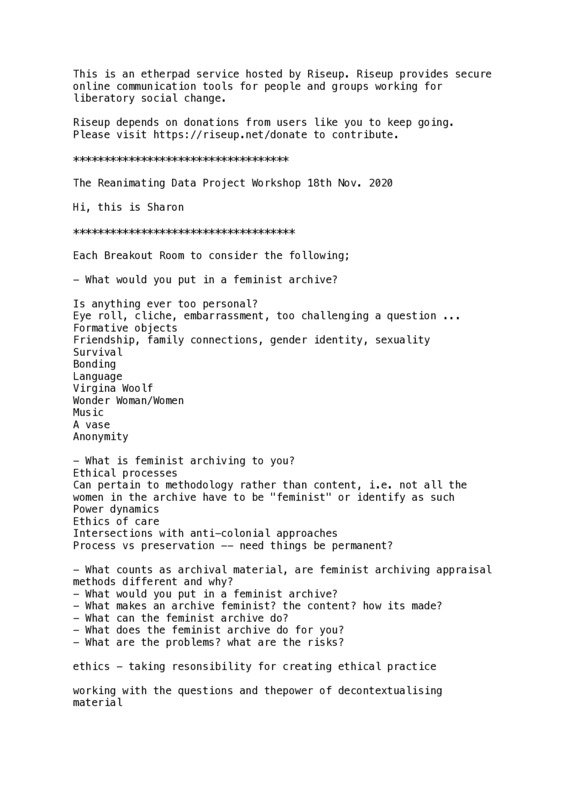| Title |
Feminist Archiving RiseUp Etherpad - Text Only
|
| Date Created |
18/11/2020
|
| Rights |
CC BY-NC-ND
|
| extracted text |
This is an etherpad service hosted by Riseup. Riseup provides secure
online communication tools for people and groups working for liberatory social change. Riseup depends on donations from users like you to keep going. Please visit https://riseup.net/donate to contribute. *********************************** The Reanimating Data Project Workshop 18th Nov. 2020 Hi, this is Sharon ************************************ Each Breakout Room to consider the following; - What would you put in a feminist archive? Is anything ever too personal? Eye roll, cliche, embarrassment, too challenging a question ... Formative objects Friendship, family connections, gender identity, sexuality Survival Bonding Language Virgina Woolf Wonder Woman/Women Music A vase Anonymity - What is feminist archiving to you? Ethical processes Can pertain to methodology rather than content, i.e. not all the women in the archive have to be "feminist" or identify as such Power dynamics Ethics of care Intersections with anti-colonial approaches Process vs preservation -- need things be permanent? - What counts as archival material, are feminist archiving appraisal methods different and why? - What would you put in a feminist archive? - What makes an archive feminist? the content? how its made? - What can the feminist archive do? - What does the feminist archive do for you? - What are the problems? what are the risks? ethics - taking resonsibility for creating ethical practice working with the questions and thepower of decontextualising material listening Finding, being found, renwing tensions between safe spaces and public spaces/ open spaces letting something unexpected happen. we don't know what feministknowledge making will look like when we share the archive. questions can be more revraling than answers. past-present relations rather than then and now collect, but how to use.creatively. do we want to do more than preserve and hoard the histories as part of dealing with trauma rather than unleashing it. Methods for getting beneath narrative, unexpected, lateral, Abira, Joan, Sharon What is feminist archiving to you? - recogniction of labour and appropriate pay - a particular approach, a process and a methology (how objects are selected, organised and described) - feminsit, queer, post-colonial, are we grappling with the same questions? - Causes disruptions - Melissa Adler, impact of lack of representation, what you can add to something that already exists rather then creating something new. - "The politics of seeing" - Heidi (Museum, objects, lessons) - feminsist organising - portable archives, building community (creative archiving) Climbling Poetree - disrupts the notion of "the" archive, broadening the parameters of the archive - the digital does this - relationship between museums and arhives, how things are accessed digitally changes this. The digital replicates. - Michelle Caswell, imagined archives. When "silenced" or absent. - archives feel fixed, feminist archives are more fluid - forming connections between the past, not being bound by time or space. Liberation - Activism - creating genealogies, activiating others to connect to history - Story-telling and creative aspects - the buidling of the archive is just the beginning of the story - creative reponses activate different responses *********************************** Key Concepts on feminst archiving (RAD Team and You) Suzanne, Ali, Niamh - the importance of trying to capture all contributions to archival work - women's archival labour can be overlooked - the significance of scale - Moravec - on the British Library being able to digitise Spare Rib - but what is possible for small archives - the choices that get made - what gets digitised and made available - how are those decisions made - decolonisation the focus of conversations in the library - but library has inherited collection from Insitute of Development Studies - the significance of the location - where is the archive, what gets donated - who gets to make decisions in archives - smaller archives having more autonomy to gather materials maybe; also the role of the idiosyncratic archivist who may get to make decisions - the significance of the digital - archival material out of context? Ester, Janet and Eleanor Thinking about the literature on feminist ethics - recognising affect and power relations are key. the attention to affect really comes through in this project - the time and the thought and the care. This is not something that some funders of open data projects are interested in. So its really important to make this work visible. Thinking through what my children would think to hear my life? Brinign affect into history. What does it mean *not* to do the research, or not to make it available? We need to take some risks in order to do ethical research, thinking about the politics of representation. |
